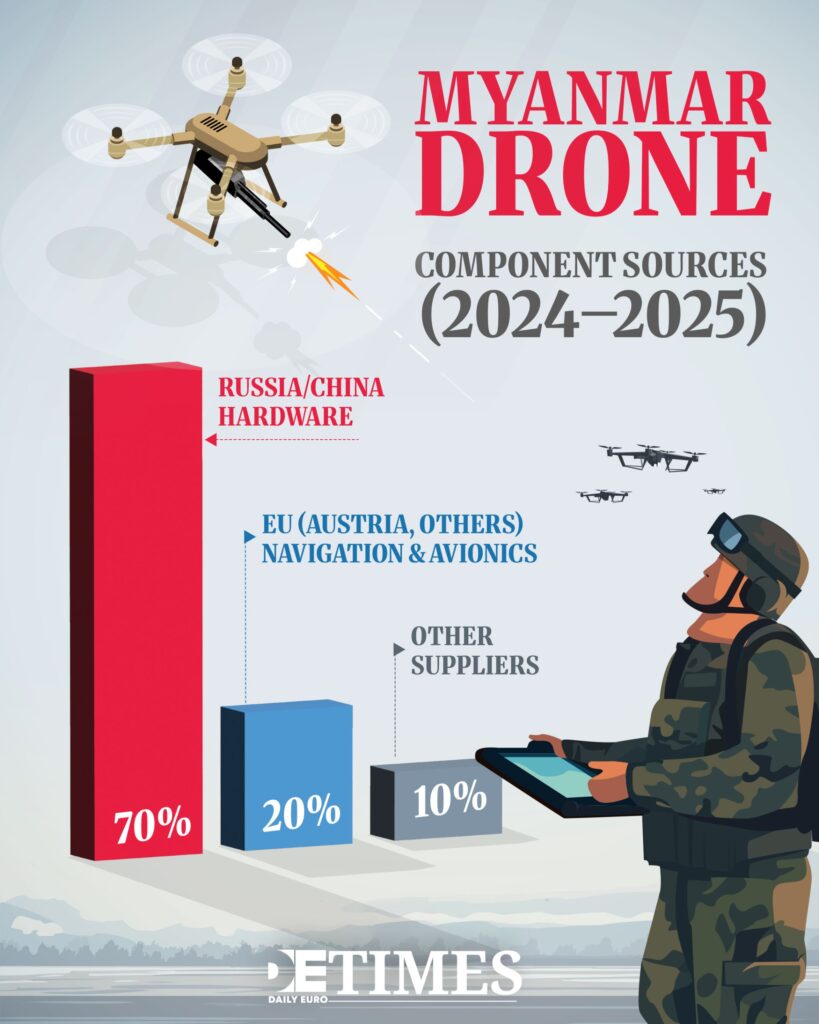European Union officials love talking about their principled stance on Myanmar. They draft comprehensive arms embargos. They update sanctions lists quarterly meanwhile. Meanwhile, EU-manufactured navigation systems help Myanmar’s junta bomb civilian targets with surgical precision.
The Technology Trail From Austria To Airstrikes
Field investigators discovered European Global Navigation Satellite System modules in downed Myanmar military drones this year.
Yet, these weren’t simple consumer electronics. The modules provide anti-jamming capabilities that make drone operations more lethal.
Austrian companies allegedly transferred aviation technology to Myanmar during active embargo periods. European customs authorities failed to detect these transactions moving through Russian intermediaries.
Myanmar’s junta conducted 1,134 airstrikes between January and May 2025 alone. European technology made many of those strikes possible.
Brussels Builds Bureaucracy While Bombers Get Built
Therefore, the European Union maintains what looks like comprehensive arms restrictions on Myanmar.
Member states must block exports of dual-use technology. Companies need licences for sensitive equipment transfers. Customs officers receive updated prohibited items lists.
None of this stops European components from reaching Myanmar’s military. Different member states enforce embargo rules differently.
Arms dealers exploit these regulatory gaps. They route European technology through third countries where oversight gets weaker.

What East Asian Partners Already Understand
Countries across East Asia grasp something European policymakers refuse to accept about Myanmar’s military procurement networks.
Regional neighbours see how junta brokers operate through Singapore, Thailand, and Hong Kong business networks. European officials write embargo rules without understanding these established trade routes.
ASEAN members know that Myanmar’s military sources equipment through multiple intermediary companies across the region. European customs systems lack visibility into these procurement chains.
As such, regional governments track cross-border military equipment flows more effectively than Brussels coordinates member state enforcement.
The Numbers Tell An Uncomfortable Truth
Myanmar’s military scaled up drone operations throughout 2024 with foreign technical assistance.
Russian and Chinese suppliers provide most hardware components. European manufacturers contribute navigation systems that make targeting more accurate. These partnerships turn basic unmanned aircraft into precision weapons platforms.
European companies exported dual-use technology worth millions of euros through broker networks between 2021 and 2024. Member state customs databases show gaps in monitoring systems during the same period.
Brussels keeps updating sanctions lists while Myanmar keeps getting European technology.
How Myanmar Outsmarts European Enforcement
Myanmar’s military procurement officers understand European regulatory systems better than the bureaucrats who write them.
Junta brokers establish shell companies in countries with weaker embargo enforcement. They purchase European components through Russian intermediaries who face fewer export restrictions.
Myanmar's procurement networks exploit timing differences between member state sanctions updates. Components get shipped during regulatory gaps before updated restrictions take effect.
European enforcement depends on voluntary compliance from companies. Myanmar’s military rewards brokers who find workarounds rather than punishing embargo violations.
Current Excuses Don’t Work Anymore
European officials will claim their embargo targets Myanmar’s procurement networks already.
They point to recent additions to restricted entity lists. They mention cooperation agreements with partner countries. They note that stopping all technology transfers remains impossible in connected global markets.
Some officials argue that dual-use items have legitimate civilian applications that complicate blanket restrictions.
These responses miss the core problem entirely: european navigation modules are showing up in weaponised aircraft over Myanmar villages month after month.
Current enforcement systems fail when EU-made components reach military drones despite comprehensive legal frameworks.
Building Accountability That Actually Functions
European Union member states need binding enforcement standards with real penalties for non-compliance.
Brussels should establish mandatory technology tracking systems. These systems must follow European components through multiple intermediary countries. Member state customs authorities require standardised training programmes for identifying dual-use items bound for Myanmar.
The European Union must expand sanctions to cover companies that facilitate technology transfers regardless of their location.
Effective embargo policy requires treating arms control like financial regulation. Banks face severe penalties for anti-money laundering failures. Tech exporters should face similar consequences for embargo violations.
Learning From Myanmar’s Procurement Success
Myanmar’s military continues accessing European technology through established East Asian trade networks that European officials barely understand.
Thai border companies, Singapore brokers, and Hong Kong shell firms all facilitate technology transfers to Myanmar’s military. European customs systems lack coordination with regional enforcement agencies.
Austrian aviation companies, Russian intermediaries, and EU navigation modules combine through these established procurement routes to support Myanmar’s expanding drone programme against civilian populations.
European policymakers must acknowledge that their current enforcement approach serves bureaucratic convenience rather than stopping weapons flows to Myanmar’s military.
Keep up with Daily Euro Times for more updates!
Read also:
A Golden Triangle: ASEAN Takes a Positive Angle
ASEAN Rethinks China Stance after U.S. Trade War
From ASEAN Aspirations to Political Crisis: ECOWAS Turns 50






